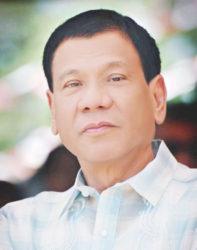WASHINGTON (Reuters) – US officials are doing their best to ignore Philippine President Rodrigo Duterte’s hostile rhetoric and taking comfort in the fact that he has yet to translate his words into less military cooperation.
The United States is trying not to give the new Philippine president, who recently appeared to liken himself to Hitler, a pretext for further outbursts while at the same time pressing ahead with military and other cooperation at lower levels, US officials said yesterday.

Two US officials said that while an open break with Manila would create problems in a region where China has grown increasingly aggressive, there are no serious discussions about taking punitive steps such as cutting aid to the Philippines.
Mindful of anti-colonial sentiment, despite the estimated 3 million people of Philippine descent living in the United States, US officials do not want to say or do anything that might encourage Duterte to turn his rhetoric into reality.
“He is like Mr Trump,” a senior Southeast Asian official said, referring to US Republican presidential nominee Donald Trump. “He craves attention, and the more he gets, the more outrageous he becomes. It is wisest to ignore him.”
In the last month, Duterte has appeared to call US President Barack Obama a “son of a bitch,” leading the White House to cancel a planned meeting, and to liken himself to Hitler, saying he would “be happy” to kill 3 million drug users and peddlers in the country.
Duterte said he regretted using that language to describe Obama and apologized to the Jewish community for his references to the Holocaust.
In his latest broadside, Duterte on Sunday said he got expressions of support from Russian Prime Minister Dmitry Medvedev and from an unnamed Chinese official after he complained of ill-treatment by Washington.
While Duterte has publicly suggested he would end joint military exercises, push US special operations forces out of the southern Philippines, and review a defence pact signed two years ago, US officials stressed none of this has happened.
US military officials said they were well aware of Duterte’s comments, but their counterparts in the Philippines had reassured them that business continues as usual.
“No one is really losing sleep over it,” said one US defence official on condition of anonymity.
“It is all bluster,” said a second defence official, saying Duterte’s remarks “have not bled over into our world.”
There are about 100 US soldiers in Zamboanga City, a Philippine military spokesman said, well below the 1,200 US forces initially deployed to help train and advise local troops fight the Abu Sayyaf Group, an Islamist militant group.
The Philippine military spokesman said he was not aware of any plan to pull them out.
Other than Japan’s 1942-1945 occupation, the United States effectively ruled the Philippines from 1898, when it acquired the island chain from Spain following the Spanish-American War, until recognizing its independence in 1946.




